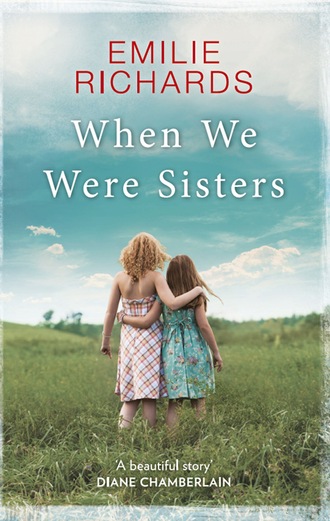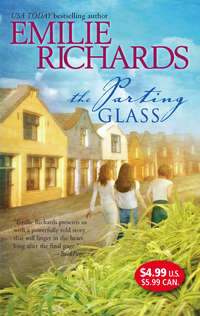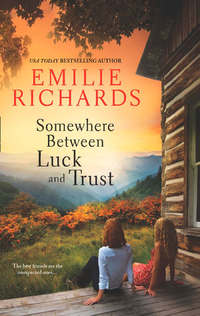
Полная версия
When We Were Sisters
She waited.
“Now your mom has to take you to school, right?”
She shrugged.
“So, would she leave Nik here to finish getting breakfast and out to the bus on time?”
“Are you kidding?”
I had been afraid of that. I tried to sound sure of myself, responsible, in control. “Everybody’s going to have to pull their own weight from now on.”
“You mean like deciding what we can wear to school and stuff?”
Pet had always been so much easier to parent than Nik that I don’t think I’d ever noticed that under that sweet smile a demon was lurking.
Nik slouched down the stairs just as Pet finished her cereal and went to brush her teeth.
“I’m going to drive your sister to school. Then I’ll come back and make sure you’re all set,” I told him.
He put his hand over his heart and widened his eyes. “Gee, you’ll trust me for the what, twenty minutes it takes to get there and back?”
Since I didn’t trust myself to answer, I left him to eat alone, and went upstairs to shave and dress for what was clearly going to be a very long day.
11
Robin
Late to work. Sorry you didn’t get me up before you left. I assume Pet’s not allowed to wear a short skirt over bare legs. K
As love notes go, Kris’s email sucked. I slipped my cell phone in the pocket of my jeans in case more recriminations were on the way. There was no telling what Kris was really sorry about on this first morning of our new life. That we hadn’t said a fond goodbye? That he had overslept and wanted me to take responsibility for that as well as everything else?
And Pet? The handwriting was already on that wall. Our daughter was testing her father. I doubted this morning would be the last time.
Switching gears from loyal wife to career photographer, I felt disoriented, and I stopped to regroup. I think I’ve forgotten how overwhelming an airport can be. I should remember. In college I chased internships and visited Cecilia wherever she happened to be. After graduation I took a job with a charitable foundation that required me to travel internationally to photograph good works and horrifying tragedies.
These days I rarely fly without family. A few times I’ve visited Cecilia on my own, but mostly when I leave town my children are with me and we’re heading off on vacation. Kris joins us when and if he can, but I can’t remember the last time the two of us went somewhere by ourselves.
Newark Liberty International Airport reminds me of a science fiction space station or Tomorrowland at Disney World. Glass and lights, sky-high ceilings floating overhead and shining terrazzo floors underfoot. As I walked toward the gate where I was to meet Cecilia and everyone flying with us, I pretended I was on my way to accept a new command: six earth years exploring outer space with the crew of the Starship Enterprise. When we were growing up Cecilia and I watched Star Trek: The Next Generation whenever we were allowed to. Space catastrophes are often more palatable than real life.
I had been surprised to find I would be flying to Newark to meet the others before continuing on to Pittsburgh, and then to Uniontown for the night. Tomorrow we drive from there to Randolph Furnace in Fayette County, south of the city, which is Cecilia’s birthplace. I’m not sure why I wasn’t booked directly to Pittsburgh, but I’m sure this trip will be filled with surprises.
The usual number of people were milling at the gate when I arrived, camera bag hanging from my shoulder and backpack carefully balanced. I’m an out-of-practice sherpa, so I was happy to take a seat and set everything on the floor in front of me.
I was adjusting my load when a man took the seat beside me. I was so glad to be temporarily free of paraphernalia that I didn’t pay attention until he spoke.
“Cecilia sent me your bio. You’re Robin Lenhart, aren’t you?”
I realized Mick Bollard himself was sitting beside me. I smiled and offered my hand. “I’m such a groupie—I know who you are.”
His hand was broad and warm. “It looks like we’re the first ones here.”
“I had no idea you’d be on this flight, too.”
“I thought we might get some footage of the trip. Just in case it makes sense later, which it probably won’t.”
I was starstruck. I was sitting next to one of the best documentary filmmakers in the business. While I’ve never considered a similar career, I appreciate everything about the genre. Working next to Mick Bollard was as much of a draw as helping Cecilia face our past.
He was somewhere in his early fifties, with a mop of graying brown hair that curled over his nape and the tops of his ears, along with raisin-dark eyes and a warm smile. He was dressed as casually as I was—faded jeans, buttoned shirt, a light windbreaker.
He seemed to like what he saw, because his smile broadened. “I’m glad you’re coming along. I’m hoping you’ll answer some questions about Cecilia’s childhood.”
“On or off camera?”
“Up to you. It’s just that you seem to have lived through a lot of her foster-care experiences, too.”
We were interrupted by a teenager who took the seat next to Mick. “I found the trail mix you like. The one with the cashews and apricots.” She turned to me, leaned over and extended her hand. “I’m Fiona Bollard.”
“Fifi,” Mick said. “My lovely daughter. She’ll be traveling with us.”
Fiona was about fifteen, but already self-possessed enough to have extended her hand and held my gaze. She was a pretty girl, with hair the dark brown her father’s must have been and the same lively eyes. Her face was longer, though, and her lips were a small, perfect bow.
As if she was used to the next part, she explained her presence without being asked. “I’m homeschooled. Mick figures I’ll learn more on the road than I will in even the best private school.”
I noted the use of her father’s first name and that Fiona had attributed that sentiment to him, not to herself. I wondered how she felt about missing the chance for social interplay with her contemporaries.
Mick answered my unspoken question. “Fifi spends summers with her mom, and Glo gets her involved in all kinds of activities to make up for her gypsy life with me.”
“He just needs somebody to carry equipment.”
Mick slung his arm over his daughter’s shoulders. “Cheaper than another production assistant. You have children, don’t you, Robin?”
As I nodded I thought about my two and wondered how they would like to have Fiona’s life. If a dose of it would give them her relaxed confidence, I would be happy to yank them out of school for a few months.
We chatted a moment before another man approached. He was in his thirties, bearded and thin as a drinking straw. His hips were so narrow he had to be wearing suspenders under his sweatshirt, because I couldn’t imagine a belt that would hold up his jeans. Mick introduced him as Jerry, director of photography.
“Which means that on this leg he’ll be doing everything that involves a video camera. Jerry’s one of the best in the business, and we’re honored to have him.”
Jerry, who had a surprisingly deep voice, nodded to a group heading in our direction. “Looks like we’re about to start work.” As he spoke he flipped the locks on a wheeled case and pulled out a camera.
I know how much technology has changed my own field and was prepared for the changes in cinema cameras, but this one was so much smaller than I’d expected. Thumbelina had replaced King Kong.
There was no time to consider that further. The small group was attracting attention, and I saw that my sister was right in the middle of it.
Cecilia was flanked by Donny and another larger man in a sport coat who hadn’t been with her at my house. A pale blonde pixie in her twenties followed behind with a wheeled suitcase, but Cecilia herself was toting a faux-leather bag large enough for a weekend of travel. She wore faded jeans ripped at the knee, like the ones we had scored at church rummage sales back in the day. In contrast, the sparkly four-inch heels and boho-chic embroidered cape hanging casually over her shoulders would never have graced a table at First Baptist.
I started to move forward to greet her, but Mick was standing now, and he rested his hand on my arm.
“You’re the photographer today, right? Not the foster sister?”
“Sister,” I said automatically, and then chagrin filled me. “And of course you’re right. I need to get busy. This is going to take some getting used to.”
“No doubt. And for my part? Sister. I hear you.” Mick left to greet Cecilia.
As I grabbed my case and lifted out the best camera and lens to document this scene, more people recognized Cecilia and crowded in. I thought about Max Filstein and what he would say. Max is nearly always right, and this was turning out to be no exception. I probably wasn’t the best person for this job. Not only had I momentarily forgotten why I was here, but I hadn’t prepared my equipment. And even when I was organized and working on cue, could I be trusted to take the shots that were really needed? The ones that portrayed Cecilia in an unfavorable light? The ones where she was clearly tired, where she looked her full forty-two and then some? The ones where she exploded in anger or sobbed in despair?
Right now, after too many years away from the career I had loved so well, I felt like a mute eight-year-old again, an unloved and unwanted child who had been given a camera by a compassionate therapist and asked to take photos of the most important moments and people in her life.
Thirty years ago that camera, one of the first generation of disposables, had changed everything. Today I would take whatever photos were required. Because Cecilia and everything this trip represented were suddenly as important to me as almost anything I had ever done.
And once again, I wanted to make myself heard.
* * *
Having a superstar on board doesn’t work magic with the airlines. We sat on the tarmac for more than an hour while rain pelted our plane and ground crews unloaded and reloaded cargo. We were never told why.
Cecilia saw the delay as a public relations opportunity, and with the flight crew’s permission she went back into coach and shook hands with starstruck passengers, signed whatever they had handy, gave tips to three teens who had-rock star aspirations and serenaded an old man who swore he had every album she had ever made, including the vinyl of her debut album, Saint Cecilia.
Jerry took footage of the visit to coach, and when I was granted permission I took photos and had subjects sign a model release app on my phone in case one was necessary later. I planned to make extensive notes about what was happening in today’s photos and those I took later, so I could pass them on to the writer if a book really materialized.
None of it was easy for me. None of it seemed natural. I hoped that would change, because hesitation and second-guessing would affect my work.
By the time the plane took off, Cecilia had made two hundred friends who would recount this meeting for weeks to come.
“There are two kinds of performers,” she told me when she finally plopped back into her seat next to mine. I was sitting in first class, too, which I was pretty sure had more to do with being her sister than her photographer.
“What kind are you?” I asked.
“The kind who honestly likes her audience and wants to give them a thrill. The kind who hugs them tight when she can because life’s a bitch, and a little fun, a little glitter, makes it a lot easier. I have friends in the business who are so cushioned nobody gets close or feels close. They’re the performers who won’t let people take photos and Tweet during the show. And my God, video? YouTube scares them shitless. They never go into the audience to shake hands or chat. I drive security crazy, but I’d rather take a risk and be loved for it than be so safe nobody remembers my name.”
“Everyone on this plane knows your name, that’s for sure.”
“And so will their friends and their friends.”
“That’s a pretty big piece of yourself you doled out back there.”
Her smile was like a burst of sunshine. “Yes, wasn’t it?” She glanced at me. “I love it.”
She did, I could tell. She was glowing. Cecilia is never happier than when she’s the center of attention. Growing up, she had so rarely been seen that she was making up for it now. On the other hand, I consciously chose to continue watching life from the sidelines so I could put my own editorial spin on it with a camera.
“Will you ever get tired of this, do you think?” I asked.
My question sobered her. I love Cecilia’s profile, topped off today with an elaborate braided knot of glistening auburn hair. Even an old-fashioned paper silhouette of my sister would be expressive. She’s more than just a singer. She’s acted in some good movies and some not so good ones, but at no time on or off film is Cecilia’s face ever truly blank. I’m not sure we see what she’s really feeling, but we always see something.
“I get tired of being mobbed.” She turned away and closed her eyes. “I get tired of being grabbed and crowded. When I’m alone at home I really like the quiet and the space. I didn’t always. For a long time it gave me too much time to think.”
“And remember.”
“That, too. We’ll be doing a lot of that in the next weeks. I haven’t been back to Randolph Furnace since my mother left me at my grandparents’ house for almost a year. She came back and got me when I was maybe six, and that was that. I must have been six, because I started school in Pennsylvania. Unless they had kindergarten...”
“That’s one of the problems with our childhoods. Unless a social worker was around to document whatever was going on, we lost the details. Now it’s just vague memories.”
“You don’t have many of those.”
I had made sure of that. “You’ve never talked much about yours.”
“I’m foggy on dates, but I sure have memories.”
“Do you have any good ones of Pennsylvania?”
For a moment it seemed as if she didn’t want to answer, but then her shoulders lifted under the elaborate cape. “My grandparents. I loved them. Maybe that’s why I never went back to Randolph Furnace. They died while I was still a child, and by then the mine had closed and the town was practically deserted. I held dying against them, I guess. You know, dying when they knew I was out there somewhere in the world with crazy Maribeth.”
I knew the answer but asked a question to keep her talking. “Your grandfather was a miner?”
“Not the healthiest profession. As it turned out neither was construction, since that’s what killed my father.”
Cecilia’s father had died in his late teens, when she was still just a toddler. A beam fell on him and quickly destroyed their little family and her mother’s ability to cope. The irony? He had chosen construction instead of mining because it seemed safer.
I was worried. These weren’t good memories. “You’ll be okay going back tomorrow? Complete with film crew and me?”
“Tonight.”
I wondered what I had missed. “Tonight? Once we settle into the inn in Uniontown there’s a crew meeting to go over what we’ll be doing.” Mick had explained what would happen. Everything we would do each day would be covered at a meeting the night before, from a briefing on the topic to transportation arrangements, our roles, logistics for each location, what shots we would cover and estimated wrap time.
“Yes, I know. I’ll be briefed after the meetings on whatever I need to know.”
I continued. “So I was told that tonight we’d be going over details for filming in Randolph Furnace tomorrow and maybe the next day, depending on weather and whatever else happens.”
“That’s Mick’s plan. But I’ve made my own. I want to go back without the crew first.”
I was sure Mick wasn’t going to like that. The point was to document Cecilia’s initial reactions on film. Not leftovers or replays. Mick was after the truth, or as much of it as anyone ever knows.
“I won’t go to the house,” she said, as if she knew what I was thinking. “I just want to drive around town a little, get a feel for what it’s like now.”
“Why?”
“So I don’t turn tail and run.”
“Isn’t this going to be one of the easier places we visit?”
“The first time you do anything it’s never easy. Like sex. Remember? Or the first week of a diet? Or how about that first baby you pushed out? You were in labor for what, ten years?”
“It only felt like ten years.”
“Come with me. We’ll steal a car.” She laughed at the noise I made. “Actually we’ll take Wendy’s rental. She won’t tell because she thinks I’ll fire her if she disagrees with me about anything.”
Wendy was the blonde pixie from the airport entourage. She was Cecilia’s assistant, hairdresser and makeup artist—which meant she did whatever Cecilia asked and then some. Of course there was also Hal, the big guy, who was a combination bodyguard and gofer, and he didn’t look easy to fool. Cecilia was insisting on as little security as was absolutely necessary. The crew and Donny would be performing publicity sleight of hand throughout the trip. She wanted to be one of the gang.
“Won’t Hal know what you’re up to?”
“He’d better. That’s what I pay him for. But I’ll tell Hal hands off. He answers to me, whether he likes what I’m doing or not. Donny’s the only one who might cause a problem. But he’ll probably be meeting with people. We’ll be able to sneak out.”
“Did you have any idea we would so quickly revert to our past? You plan escapades guaranteed to get us both in trouble, and I go along because I love you?”
“Even the worst childhoods have their high points.” She rested her head on my shoulder and closed her eyes for the rest of the flight. I leaned against her and made myself comfortable, too.
Конец ознакомительного фрагмента.
Текст предоставлен ООО «ЛитРес».
Прочитайте эту книгу целиком, купив полную легальную версию на ЛитРес.
Безопасно оплатить книгу можно банковской картой Visa, MasterCard, Maestro, со счета мобильного телефона, с платежного терминала, в салоне МТС или Связной, через PayPal, WebMoney, Яндекс.Деньги, QIWI Кошелек, бонусными картами или другим удобным Вам способом.










